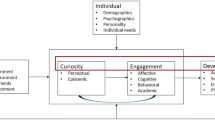Abstract
My purpose in this commentary was to seek out any common ground that might be found for theory and research on curiosity and interest as detailed by the contributors to this special issue. Despite the numerous differences that these authors demarcated, several areas of concurrence were readily identified. Those seven areas are, thus, specified and summarized. This commentary then concludes with the forwarding of three questions intended to provoke curiosity or fuel the interest of those engaged in research on these two complex and challenging constructs and their various manifestations.
In framing my commentary to this thought-provoking special issue, Curiosity and Interest: Conceptual Distinctions, Relations, and Implications for Educational Practice, I set out to map the common ground that those investigating curiosity or interest occupied. This is what Wilson (1998) described as a search for consilience or unity of knowledge. Thus, with the mapping of common ground as my goal, I looked for points of agreement in the conceptions, components, procedures, antecedents, and consequences of curiosity and interest as described by the contributing authors. This exploration, indeed, proved fruitful. In what follows, I summarize the emergent principles that form this common ground for curiosity and interest. Then, in keeping with my role as commentator, I conclude with several provocations for contributing authors and others invested in the study of curiosity or interest to weigh. In so doing, I hope to engender their curiosity and fuel their interest.
Similar content being viewed by others
References
Ainley, M. (this issue). Curiosity and interest: emergence and divergence. Educational Psychology Review.
Alexander, P. A., & Grossnickle, E. M. (2016). Positioning interest and curiosity within a model of academic development. In K. Wentzel & D. Miele (Eds.), Handbook of motivation at school (2nd ed., pp. 188–208). New York: Routledge.
Alexander, P. A., Sperl, C. T., Buehl, M. M., Fives, H., & Chiu, S. (2004). Modeling domain learning: profiles from the field of special education. Journal of Educational Psychology, 96, 545–557.
Alexander, J. M., Johnson, K. E., Leibham, M. E., & Kelley, K. (2008). The development of conceptual interests in young children. Cognitive Development, 23, 324–334. https://doi.org/10.1016/j.cogdev.2007.11.004.
Dewey, J. (1913). Interest and effort in education. Cambridge, MA: Riverside Press.
Garner, R., Gillingham, M. G., & White, C. S. (1989). Effects of “seductive details” on macroprocessing and microprocessing in adults and children. Cognition and Instruction, 6, 41–57. https://doi.org/10.1207/s1532690xci0601_2.
Hidi, S. E., & Renninger, K. A. (this issue). Interest development and its relation to curiosity: needed neuroscientific research. Educational Psychology Review.
Jepma, M., Verdonschot, R. G., van Steenbergen, H., Rombouts, S. A., & Nieuwenhuis, S. (2012). Neural mechanisms underlying the induction and relief of perceptual curiosity. Frontiers in Behavioral Neuroscience, 6, 5.
Litman, J. A. (2005). Curiosity and the pleasures of learning: wanting and liking new information. Cognition and Emotion, 19, 793–814. https://doi.org/10.1080/02699930541000101.
Murayama, K., FitzGibbon, L., & Sakaki, M. (this issue). Process account of curiosity and interest: a reward-learning perspective. Educational Psychology Review.
Peterson, E., & Cohen, J. (this issue). Epistemic underpinnings of curiosity development: a case for domain-specific curiosity in mathematics. Educational Psychology Review.
Renninger, K. A. (2010). Working with and cultivating interest, self-efficacy, and self regulation. In D. Preiss & R. Sternberg (Eds.), Innovations in educational psychology: perspectives on learning, teaching and human development (pp. 107–138). New York: Springer.
Renninger, K. A., & Hidi, S. (2011). Revisiting the conceptualization, measurement, and generation of interest. Educational Psychologist, 46(3), 168–184. https://doi.org/10.1080/00461520.2011.587723.
Renninger, K. A., & Hidi, S. (2016). The power of interest for motivation and engagement. New York: Routledge.
Schiefele, U. (1991). Interest, learning, and motivation. Educational Psychologist, 26(3-4), 299–323. https://doi.org/10.1080/00461520.1991.9653136.
Shin, D. D., & Kim, S.-I. (this issue). Homo curious: curious or interested? Educational Psychology Review.
Silvia, P. J. (2017). Curiosity. In P. A. O’Keefe & J. M. Harackiewicz (Eds.), The science of interest (pp. 97–107). Cham, Switzerland: Springer.
Wade, S. E. (2001). Research on importance and interest: implications for curriculum development and future research. Educational Psychology Review, 13(3), 243–261. https://doi.org/10.1023/A:1016623806093.
Wilson, E. O. (1998). Consilience: the unity of knowledge. New York: Knopf.
Author information
Authors and Affiliations
Corresponding author
Additional information
Publisher’s Note
Springer Nature remains neutral with regard to jurisdictional claims in published maps and institutional affiliations.
Rights and permissions
About this article
Cite this article
Alexander, P.A. Seeking Common Ground: Surveying the Theoretical and Empirical Landscapes for Curiosity and Interest. Educ Psychol Rev 31, 897–904 (2019). https://doi.org/10.1007/s10648-019-09508-x
Published:
Issue Date:
DOI: https://doi.org/10.1007/s10648-019-09508-x




